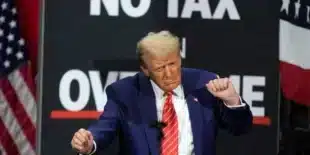### Republican National Convention Focuses on Economy Amid Recent Rally Shooting
The first night of the Republican National Convention on Monday concentrated on economic issues, even after the recent shooting at a rally in Pennsylvania where former President Donald Trump was injured.
Speakers emphasized that Trump’s return to the White House would address inflation and restore prosperity. Virginia Governor Glenn Youngkin commented, “Tonight, America, the land of opportunity, just doesn’t feel like that anymore.”
However, Trump’s campaign has yet to release detailed policy plans or legislative proposals. Instead, they are banking on voter preference for Trump’s attitude over specific policies.
Trump has mentioned plans for tariffs on trade partners, eliminating taxes on tips, and slightly reducing the corporate tax rate. The Republican platform also includes promises to “defeat” inflation, lower prices quickly, and increase the production of oil, natural gas, and coal.
The platform also proposes the “largest deportation program in American history” to address illegal immigration and plans to roll back President Joe Biden’s policies on electric vehicles and renewable energy.
Critics, including Democrats and leading economists, argue that Trump’s proposals could lead to significant inflation, hurt the middle class, and add over $5 trillion to the national debt by extending his soon-to-expire tax cuts.
In June, the Associated Press sent the Trump campaign 20 questions to clarify his economic views, but the campaign declined to respond. Spokeswoman Karoline Leavitt directed the AP to video clips of Trump speaking.
In contrast, Biden has presented a detailed 188-page budget proposal outlining his economic vision. However, his campaign has recently faced challenges, including questions about his age and suitability as a candidate after a challenging debate on June 27.
A Peterson Institute of International Economics analysis indicated that deporting 1.3 million workers would shrink the U.S. economy by 2.1%, effectively causing a recession.
Stephen Moore, a Trump advisor and economist at the Heritage Foundation, noted that Trump’s first term provides a clear indicator of his potential second-term policies. He dismissed concerns of a radical agenda, suggesting Trump would take a pragmatic approach to stimulate economic growth.
Some of Trump’s proposals have garnered bipartisan support. For example, Nevada’s Democratic Senators Jacky Rosen and Catherine Cortez Masto support banning taxes on tips for workers, aligning with Trump’s stance, though the Biden administration supports a higher minimum wage for tipped workers.
Businesses favor Trump’s regulatory cuts and plans to reduce the corporate tax rate from 21% to 20%, compared to Democrats’ proposal of a 28% rate to fund middle-class programs and reduce the deficit.
However, Trump’s substantial tariff proposals could have adverse economic effects. Biden maintained Trump-era tariffs on China and imposed additional restrictions on advanced chip exports to China. Economists Kimberly Clausing and Mary Lovely estimate Trump’s tariffs could cost U.S. households an additional $1,700 annually.
Clausing highlighted the risks of Trump’s economic policies, warning that the proposed tariffs on over $3 trillion of imports could escalate consumer prices and increase manufacturing costs, exacerbating inflation.
Research by economists David Autor, Anne Beck, David Dorn, and Gordon Hanson found that while Trump’s first-term tariffs did not boost employment, they did enhance his political support in industrial regions affected by job losses to China.
Clausing cautioned that the drastic increase in tariffs proposed by Trump could lead to a significant rise in prices, posing severe economic risks. “I think people will notice when everything gets wildly expensive,” she said. “This is going to be a huge disaster.”


